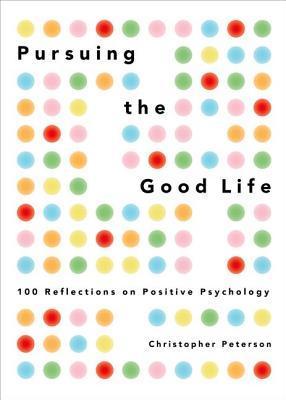A Quick Summary of the Science of Positive Psychology
I like to get all worked up about ego development, mysticism, meditation, integral life practice, and all that jazz. But when it comes down to it, the scientific research on positive psychology shows that some of greatest pointers to what makes people happy are relatively simple.
Here is a simple list that Christopher Peterson, thought of as one of the co-founders of the field of Positive Psychology and former chair of clinical psychology at the University of Michigan, has to say about it.
(From psychologytoday.com)
“Positive psychology will rise or fall on the science on which it is based. So far, the science is impressive. Consider what has been learned in recent years about the psychological good life, none of which was mentioned in any of the psychology courses I took a few decades ago:
• Most people are happy.
• Happiness is a cause of good things in life and not simply along for the happy ride. People who are satisfied with life eventually have even more reason to be satisfied, because happiness leads to desirable outcomes at school and work, to fulfilling social relationships, and even to good health and long life.
• Most people are resilient. (Get back up again after being knocked down)
• Happiness, strengths of character, and good social relationships are buffers against the damaging effects of disappointments and setbacks.
• Crisis reveals character.
• Other people matter mightily if we want to understand what makes like most worth living.
• Religion matters.
• And work matters as well if it engages the worker and provides meaning and purpose.
• Money makes an ever-diminishing contribution to well-being, but money can buy happiness if it is spent on other people.
• As a route to a satisfying life, eudaimonia trumps hedonism. (Satisfaction based on noble purpose instead of self-gratification)
• The “heart” matters more than the “head.” Schools explicitly teach critical thinking; they should also teach unconditional caring.
• Good days have common features: feeling autonomous, competent, and connected to others.
• The good life can be taught.
This latter point is especially important because it means that happiness is not simply the result of a fortunate spin of the genetic roulette wheel. There are things that people can do to lead better lives, although I hasten to say that all require that we live (behave) differently … permanently. The good life is hard work, and there are no shortcuts to sustained happiness.”
Later in his book Pursuing the Good Life: 100 Reflections on Positive Psychology, Dr. Peterson sums it up: “what makes life worth living is not a psychological process. It is work, love, and play.” He later adds “service to others.”
I like to think of this as a good compass whenever I feel lost.

